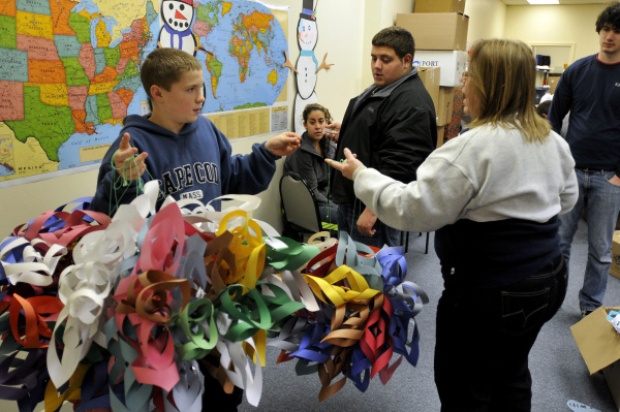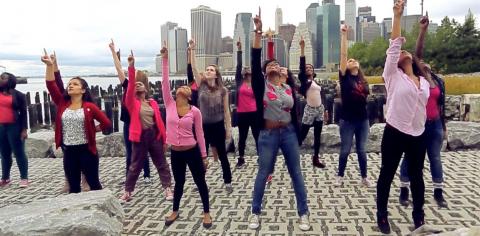
Originally published in One Voice, the official blog of the National PTA.
By Becki Cohn-Vargas, Not In Our School Director
You could hardly blame me for thinking of the past two years as proof that humanity is doomed and deserves it. That’s what I told myself as I thought back on some of the recent horrors: schoolchildren massacred in Newtown, Connecticut. Movie watchers mowed down in Aurora, Colorado. Sikh worshipers murdered in Oak Creek, Wisconsin. Gang rapes in broad daylight. Not to mention that after the bombings in Boston, people are afraid to go out to cheer for a marathon. I could go on, but I think you get the picture.
I’ve always been active in the cause of human progress. Over the decades I was part of two anti-war movements: to end the War in Viet Nam, and to prevent intervention in Central America. I was also part of the first anti-rape movement. And now I work as the Director of the Not In Our School program at Not In Our Town, an organization that spawned a movement to end hate, intolerance, and bullying.
Ending hate, intolerance, and bullying — these are monumental tasks!
In light of all the bad news I was hearing on a daily basis, I needed to see some progress for the human race. I needed to hear some good news, though I doubted I would. But to my surprise, and maybe to yours, I did!
After the Sandy Hook shootings, the National Parent and Teachers Association made a public appeal for paper snowflakes to cheer the students when they returned to school. The response was a literal blizzard from across the world. That little act of empathy got me thinking differently about things.
Then I read in the British newspaper The Spectator that 2012 was possibly the best year ever in human history. Why would they say that? The article said that 2012 saw fewer deaths from war, disease, and hunger than any previous year since we started to keep such statistics. That astonishing report certainly gave me pause and made me look deeper.
Here are some surprising facts I discovered:
- War: The Oslo Peace Research Center reported fewer war deaths in 2012 than at any time during the last century. Steven Pinker’s book, The Better Angels of Our Nature, backs this up. Tracking the history of war, it shows that violence actually has declined dramatically, making today’s world the safest in history.
- Poverty: In 1990, the United Nations set “Millennium goals” to cut world poverty in half by 2015. Did you know that we met that goal in 2008
- Disease: Deaths from lung cancer and breast cancer were down by one-third in the last 40 years, and life expectancy is up across the globe.
- Rape: The U.S. Justice Department has reported that rapes have plunged 85% since 1970, which was when I became involved with others in starting a rape crisis center, one of many that sprang up in that decade. In Better Angels, Pinker points out that rape has long been considered a standard feature of war and conquest. Now concern about ending rape has become international, as thousands of women and men protest rape in the U.S. military, brutal rapes in the Congo, and recent gang rapes in Delhi, to name just a few examples.
What is making the difference?
One factor is the human capacity for empathy. Economist Jeremy Rifkin explored this theme in a 2010 TED (Technology, Education, Design) talk. “To empathize is to civilize,” said Rifkin.
He described us humans as being biologically programmed for empathy. Empathy has evolved through different stages in history, each time extending a bit more as humans organized themselves as clans, city-states, nations, and now globally. And while the planet has seen violence and bloodshed each step of the way, over the years we have stretched our empathy to more and more people as we have reached beyond the boundaries of blood ties, religion, nation, and ethnic group. There is no questions that people are still people fighting for clans, land, and national sovereignty today. Now, however, as our connections become more and more global, we continue to embrace others who are different from ourselves. We are even extending empathy to the entire planet, not only to people, but also to the natural world. This capacity to be both globally empathic and more global in our thinking is spurring a growing number of world citizens to also expand their horizons. I agree with Rifkin that global empathy is ultimately the hope for the future of humanity.
This is progress!
So now, when I look back at the horrific events of the past two years, that’s not all I see. I see progress in the making.
I see people rising up in empathy against small and large acts of violence, hate, and bigotry, and in favor of kindness and acceptance. People around the world responded to support the Sikh community after the massacre in Oak Creek. People in towns and in schools across the world are taking a stand against bullying and are reaching out to those who are excluded, now that millions have viewed the movie Bully.The tide of US public opinion has turned in support of gay marriage, an important step toward social equality. Performer and anti-rape activist Eve Ensler’s One Billion Rising, mobilized of people across the globe to dance on Valentine’s Day, was created to help end violence against women.
Small things matter too: Richard, the owner of a Virginia auto-body shop, fixed a car for free for a college student that had anti-gay slurs keyed into it. Grace, a 13-year-old Canadian girl with Asperger’s syndrome who had been bullied for years, started a bullying prevention effort at her school. John, a Special Olympian, sent a letter of protest when President Obama was called a “retard,” explaining why we should not use that word and thousands supported him. These are just a few examples I know of. You must know of many, too.
We still have a lot to do to end raw violence, all types of rape and also its subtler forms, such as when violence turns inward as the result of depression or other mental health conditions.
I see all this evidence of progress as an invitation to expand our efforts to extend empathy across the globe. If you have been discouraged by the daily news reports of hate or violence, know that your efforts will eventually bear fruit. Join with Not In our Town to bring your community together to end bullying and create inclusive communities. Work to end income inequality. Work to get assault weapons banned and off the streets. Extend empathy to our planet and turn the tide of climate change. Work in your community to make everyone feel safe and included.
Or do what you are already doing, whether it is seeking better care for the elderly, running a marathon to raise funds for cancer research, or teaching a child to read.
I refuse to see only the bad news. I know from my own experience that when people get together to help one another, accept one another, learn from one another, they create a force that is stronger than violence and hatred.
In their “snowflake” appeal for Newtown, the National PTA received enough snowflakes to cover the entire town. It’s all our actions together that will move us toward the “empathic civilization” in a global blizzard of metaphorical snowflakes.
Becki Cohn-Vargas, Ed. D. is currently the director of Not In Our School (NIOS). She has spoken on the subject of how to combat bullying at conferences, schools, and universities across the United States. Becki’s new book,“Identity Safe Classrooms: Places to Belong and Learn,” co-authored with Dr. Dorothy Steele was published by Corwin Press. Prior to working at The WorkingGroup, she spent over 35 years in public education in California.

Add new comment